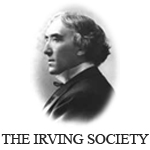Sir Henry Irving (1838-1905)
Born in Somerset in 1838, the year of Victoria’s Coronation, Irving’s rise to prominent as an actor-manager was a slow and torturous one. Against his Methodist mother’s wishes he chose a profession still much tarnished with the stigma of rogues and vagabonds.

He began his acting career in 1856, appearing with various provincial Stock companies, playing during the following ten years over 600 parts. By 1866 he was established in London but it was to be another five years before he found over night fame in “The Bells“.
For the next thirty years he was to be at the centre of Victorian Society. In 1895 he became the first actor to be knighted for his achievements, setting a standard of social respectability and professional integrity. Sadly his mother did not live to witness any of his success.
Irving was also a man of letters with honorary doctorates from Cambridge, Dublin and Glasgow Universities. He became a mason and was a close associate of leading politicians and the monarchy.
As a master of mise-en-scène he was at the forefront in the development of gaslight for his spectacular productions of Shakespeare and Romantic Melodrama at the Royal Lyceum Theatre, London between 1871 and 1902 and was sole manager of that theatre from 1878 to 1899. During this period and until 1902 Ellen Terry was his leading lady.
In 1904 the interior of Irving’s theatre had to be demolished because it did not comply with new safety regulations. The new auditorium was designed by Bertie Crewe. In 1996 Apollo Leisure Group refurbished and re-opened Crewe’s Lyceum.
Irving invited leading figures of the cultural world to contribute to his productions. These included the artists Telbin, Tadema and Burne-Jones, composers German, Mackenzie, Sullivan and Stanford and authors Pinero, Tennyson, Albery, Sardou and Conan Doyle.
 He made eight major tours across North America between 1883 and 1904, setting new standards in visual presentations and ensemble playing. He regularly took his productions to the major cities in the UK. In 1904 Irving started on a series of Farewell Tours with plans to retire in 1906, after celebrating fifty years on the stage. His sudden death on October 13th 1905 shocked and saddened the nation.
He made eight major tours across North America between 1883 and 1904, setting new standards in visual presentations and ensemble playing. He regularly took his productions to the major cities in the UK. In 1904 Irving started on a series of Farewell Tours with plans to retire in 1906, after celebrating fifty years on the stage. His sudden death on October 13th 1905 shocked and saddened the nation.
His was the age of Victorian values, which saw the exaltation of wealth in a new industrial society. It was an age that threw up a new middle class thirsting for knowledge and cultural experience. On these premises was founded a growing demand for theatre. The quality of Irving’s performances and his stage management skills helped to feed and promote these attitudes.
Irving became financially successful, socially popular and internationally famous. It was the essayist and critic Sir Max Beerbohm that dubbed him THE KNIGHT FROM NOWHERE – the title of a little book of Pre-Raphaelite poems. A title he thought appropriate for an only son of a travelling salesman called Brodribb, who as Henry Irving had a personality that outshone his acting but never his ‘Art’.
The Irving Society by recalling theatre in the age of Irving, aim to perpetuate his memory with their activities.
